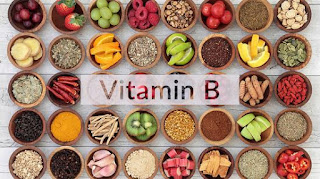There are many skin vitamins that contribute to healthy and nourished skin, and each vitamin helps treat a specific skin problem. If you are looking for a solution to your skin problems with vitamins then you need to read the following lines to learn what vitamins your skin needs..
Vitamin A for skin
This vitamin helps rebuild skin tissue, and in the event of sun exposure, dark and damaged cells are replaced with new ones.
Vitamin A saves you from dark or brown spots that appear in your skin.
Helps fight wrinkles and signs of aging, if your skin is dry and prone to cracking the love guys, it means you need to vitamin A.
The most important natural sources of vitamin A: dark green or yellow vegetables and fruits such as broccoli, spinach, carrots, sweet potatoes, cantaloupe, pumpkin, and apricots. Also available in milk, cheese, and eggs.
Vitamin B for skin
Vitamin B3 contributes to improving overall skin health and gives it a fresher and more youthful look.
Taking vitamin B5 as a supplement or through foods rich in it not only reduces the appearance of acne but also reduces skin pigmentation caused by the effects of acne.
Taking vitamin B12 and B5 as a supplement or through foods rich in it makes it more powerful to get rid of chronic skin problems such as eczema and psoriasis as well as reduce skin pallor as well.
Vitamin B12 helps moisturize the skin and maintain its smoothness.
Vitamin B3 reduces the risk of skin cancer because it serves as a natural skin protector from UV rays.
The most important sources of vitaminb1 are natural: eggs, nuts, raisins, add to tomatoes, cauliflower and carrots. Brown rice (especially rice bran), fish, legumes, liver, peanuts, peas, wheat germ, whole grains, Brewer’s yeast, oats, broccoli, herbs containing vitamin B1 fenugreek, fennel seeds, burdock root, Macedon and mint.
Vitamin C for skin
Vitamin c helps neutralize free radicals that accelerate skin damage and protects against oxidation-induced aging and sun-induced skin damage.
The use of vitamin C serum reduces dermatitis by inhibiting the inflammatory response of the epidermis.
Vitamin C contributes to increasing the body’s production of ceramides and other fats, automatically improving skin barrier function, keeping moisture levels higher and thus having softer, more elastic skin that can better alleviate the manifestations of aging.
Vitamin C is a natural skin exfoliator to get rid of dead skin cells that can create dull skin and produce brighter and fresher skin.
Vitamin C serum promotes collagen production in the skin, which keeps the skin soft and elastic, reducing the appearance of wrinkles and keeping the skin young for as long as possible.
Vitamin C harmonizes skin tone and helps improve the appearance of dark spots caused by UV exposure and the aging process, and its continuous use prevents the body’s production of melanin, and corrects existing dark spots for a more pure and clear skin tone.
Vitamin C helps relieve oily skin problems by exfoliating and moisturizing the skin, fighting bacteria and inflammation and balancing the levels of oil secretions on the skin in vitamin C to be a good friend for those with oily skin prone to acne.
The most important natural sources of vitamin C: orange, lemon, kiwi, strawberry, watermelon, guava, papaya, strawberries, grapefruit also contain many vegetables on vitamin C by a large percentage, such as bell pepper confetti, broccoli, cabbage, spinach, broccoli, tomatoes, Brussels sprouts, cucumber, sweet pepper, cabbage, vegetable oils and all products containing it, is considered wheat germ oil source.
Vitamin E for skin
Topical application of vitamin E oil helps to slightly relieve hyperpigmentation, and its effectiveness increases when vitamin С is added to it.
The treatment applied in the treatment of acne: The some claim that using it helps in getting rid of these scars, but studies indicate that it is effective, and accelerates the healing process, this means that its use for this purpose does not give the desired results.
It helps moisturize the skin well, and this may contribute to making it look more youthful.
It reduces itching, relieves eczema, but it can’t cure allergies, infections, and other itchy conditions, it only helps moisturize the skin, temporarily relieving the itching caused by it, and any other skin-safe oil can offer this benefit.
It prevents or reduces sunburn due to its oil’s role in hydrating and soothing dry and scaly skin, so it may help relieve sunburn and itching, yet using sunscreen and avoiding direct sun exposure remains the best strategies to protect the skin.
The most important natural sources of vitamin E: sweet potatoes, mango, butter, eggs, wheat germ oil, soy, spinach, broccoli, corn, avocado. Also, nuts contain a large proportion of vitamin E, such as walnuts, hazelnuts, sunflower seeds, almonds, spinach, parsley, mustard, balls, lettuce, line, broccoli, asparagus, tomatoes, cabbage, celery, and carrots are all sources rich in huge quantities of vitamin E.
Vitamin k for skin
The application of vitamin K helps to treat skin pigmentation caused by weakened or damaged capillaries, because it is absorbed directly into the blood vessels to help treat bruises. It also helps to eliminate the effects of dark circles under the eyes.
Natural sources of vitamin K: green leafy plants such as spinach, chard, lettuce, watercress and cabbage (cabbage, kale, cauliflower, marketed cabbage and fruits such as grapes, avocados and Kiwi contain high vitamin K.

